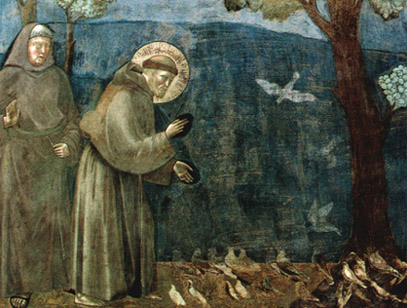
When my Christian faith first began to radicalize, I became very interested in the Franciscan tradition. The advocacy for radical discipleship, peace, and social and environmental justice that is associated with the ministry of Francis of Assisi naturally appealed to me. At first, I did as many do, and associated the Franciscan tradition with Roman Catholicism, but as I studied more, I found that the Franciscan movement is actually surprisingly diverse.
Back when Francis first started out, there were already a few different sects that identified with his movement, and some were so radical that they were even expelled as heretics. To be honest, I am surprised that Francis was not expelled as a heretic, like so many similar figures were. Even today, there are multiple Franciscan orders in the Roman Catholic Church, and there are numerous Anglican, Lutheran, Old Catholic, and ecumenical Franciscan orders. When I first started investigating the Franciscan tradition, and considered joining it, it was the Order of Ecumenical Franciscans that appealed to me. I actually planned on joining this order. I had spoken with one of their members about it, and even had the application ready to send in, but other events in my life caused me to put that on hold. I started to study other radical traditions, such as the Anabaptists, instead.
It did not take me long to identify with the Anabaptists, and because I did not have an Anabaptist church near me, I sought community through other means, such as joining the Young Anabaptist Radicals community. Recently, however, I came in contact with another ecumenical Franciscan order affiliated with the Old Catholic and Progressive Episcopal communities. That order is the Order of Franciscan Servants. Though affiliated with independent Catholic and Anglican churches, it is ecumenical, and so open to all varieties of Christianity. Fate presented me with another opportunity to be a Franciscan. Instead of letting something get in the way of that like last time, I have taken the opportunity, and now I am currently a postulant, which basically means that I am in training to be a full member of the OFS. While now officially becoming Franciscan, I find that I still identify with the Anabaptist tradition (and similar radical traditions).
A few weeks back, I was listening to a lecture by Mark Van Steenwyk on Christianity and anarchism, called “Jesus and the unKingdom of God,” that he had presented to the Little Flowers Community of Winnipeg. What is interesting about the Little Flowers Community is that they identify with both the Anabaptist and Franciscan traditions. It really seems to be a common trend among many churches that could be described as “New Monastic.”
Despite the Franciscan tradition’s association with a hierarchical ecclesiology, the early movement had a lot of similar characteristics to that of the early Anabaptists. Obviously, there was an emphasis on social justice, peace, and commitment to the gospel that they both shared, but the fact the first Franciscans were layman, that the movement has always been diverse (with both conventional and unconventional strains), simply reinforces any similarities between the two. Really, one could see the Anabaptists as a continuation of the original motivations behind the first Franciscans. One could also include the Waldensians, Diggers, liberation theologians, and New Monastics in a similar fashion.
My journey to Franciscan spirituality is not my leaving Anabaptism. Rather, it is adding yet another flavor to an already complicated Christian perspective. Perhaps I am giving my Anabaptism some Franciscan flavor, or maybe, because I came to Anabaptism after my initial attempts to be a Franciscan, I am giving my Franciscan approach some Anabaptist flavor. Either way, I now comfortably see myself in both the Anabaptist and Franciscan traditions — which really only means that I am seeking to take the gospel seriously.
Pingback: Week’s Links |
Pingback: Franciscan and Anabaptist | Koinonia Revolution
Kevin,
I cannot believe what I am reading here. Your experience is almost identical to mine. Working at a Catholic college, I found Franciscans on campus and we created a discussion group to study Francis and do some formation. But, I knew deep-down inside I am an Anabaptist/Pietist without any congregational presence where I live. I found ways in an online fellowship and volunteering with Church of the Brethren…and I continue to be Franciscan. Peace and every good. – Phil